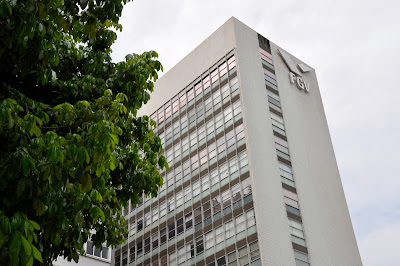 |
| Caught a glimpse of Rio's clean and efficient Metrô while saving on taxi fare |
Named after Portuguese settler João Pereira de Souza Botafogo, the district rose to prominence after the construction of a royal villa here during the late 1800s for Carlota Joaquina, the wife of Dom João VI. With royalty established in the area, arriving aristocrats built stately mansions, many of which still stand as theaters and schools, giving Botafogo the nickname "bairro das escolas." The neighborhood is also home to nearly 20 foreign consulates—including those of Portugal, Germany, Spain, Norway, Argentina and China—which overlook Av. das Naçoes Unidas and the praia (beach) of Botafogo.
 |
| To the west, a cathedral, a cluster of schools and, in the background, Cristo Redentor |
Refueled at a local juice stand with lemonade and a bowl of açaí. Brazilian juice stands—which sell a variety of fresh-squeezed juices as well as snacks such as açaí and salgados—are a national institution and are ubiquitous throughout the city.
 |
| I now know the Portuguese names of at least a dozen tropical fruits. |
Botafogo is also home to an impressive number of multinational corporate offices:
 |
| Centro Empresarial houses offices of Samsung, Ernst & Young, Mitsubishi and Statoil, among many others |
My primary motivation for visiting Botafogo, though, was not the tourist attractions but rather a scheduled meeting with the Fundação Getúlio Vargas (Getúlio Vargas Foundation), a leading Brazilian institute of higher education, academic research center and, according to Foreign Policy, one of the top five "policymaker think tanks" in the world.
I had the opportunity to have lunch with Dr. Álvaro Cyrino, deputy dean of the Escola Brasileira de Administração Pública e de Empresas. During our subsequent interview, Dr. Cyrino, an academic expert and adviser to numerous corporations, talked about the future of innovation in the Brazilian economy. Keep an eye out for his insight in the spring issue of Business Sphere magazine!
 |
| Fundação Getúlio Vargas |